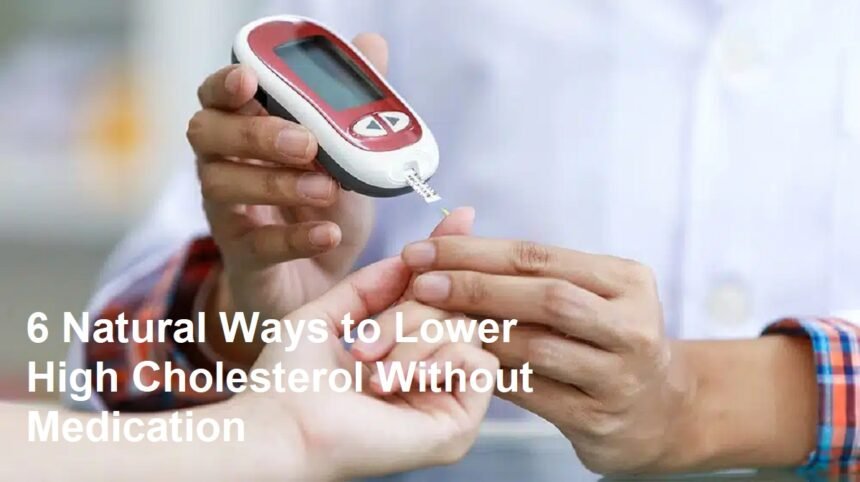Introduction
High cholesterol is often called a “silent risk.” You may not feel it, but it can increase your chances of heart disease and stroke if left unmanaged. While medications are sometimes necessary, many people can successfully reduce cholesterol levels through lifestyle changes.
In this article, we’ll explore 6 ways to lower high cholesterol without medication, backed by doctors’ explanations about cholesterol, plus common mistakes people make (and how to prevent them). Let’s dive in!
What Doctors Say About Cholesterol
Understanding Cholesterol in Simple Terms
Doctors often explain cholesterol as a fat-like substance found in your blood. Your body needs it to build cells and produce hormones. However, too much “bad” cholesterol (LDL) can build up in your arteries, leading to serious health issues.
Expert Opinion: Why Lifestyle Changes Work
Medical experts agree that lifestyle adjustments can be as effective as medication—especially in mild to moderate cases. According to cardiologists:
- Diet and exercise directly affect cholesterol balance.
- Weight management reduces LDL and raises HDL (the “good” cholesterol).
- Consistency is more important than quick fixes.
6 Ways to Lower High Cholesterol Without Medication
1. Adjust Your Diet
Food plays the biggest role in cholesterol levels. To start:
- Eat more fiber-rich foods like oats, beans, lentils, apples, and leafy greens.
- Add healthy fats such as avocados, olive oil, and nuts.
- Cut down on saturated and trans fats from fried foods, processed meats, and pastries.
Tip: Try the “Mediterranean style” of eating—rich in veggies, fish, and whole grains.
2. Exercise Regularly
You don’t need a gym membership to improve cholesterol. Doctors recommend at least:
- 150 minutes of moderate exercise per week (like brisk walking or cycling).
- Short, consistent sessions (20–30 minutes a day) are better than once-a-week long workouts.
Tip: Choose activities you enjoy—dancing, swimming, or hiking count too!
3. Maintain a Healthy Weight
Even a small drop in weight can significantly lower cholesterol. Research shows that:
- Losing just 5–10% of body weight can reduce LDL and triglycerides.
- Belly fat is especially linked to cholesterol problems, so focus on waistline health.
Tip: Combine portion control with mindful eating. Don’t skip meals—just eat smarter.
4. Quit Smoking and Limit Alcohol
Both smoking and excessive drinking damage blood vessels and raise cholesterol risks.
- Quitting smoking can increase HDL cholesterol almost immediately.
- Limiting alcohol (1 drink/day for women, 2 for men) keeps triglycerides in check.
Tip: Replace the smoking habit with healthier coping strategies like chewing sugar-free gum or taking a quick walk.
5. Manage Stress
Chronic stress can raise cholesterol by triggering unhealthy habits like overeating and smoking.
- Practice relaxation techniques such as deep breathing, meditation, or yoga.
- Prioritize quality sleep—lack of rest can worsen cholesterol imbalance.
Tip: Try mindful breathing for 5 minutes a day to calm your body and mind.
6. Stay Consistent with Regular Checkups
Lifestyle changes take time, and monitoring progress is essential.
- Get your cholesterol levels checked every 6–12 months.
- Track your progress and adjust your plan as needed.
- Doctors can give personalized advice even if you’re not on medication.
Tip: Treat checkups like progress milestones, not punishments.
Common Mistakes and How to Prevent Them
Mistake 1: Thinking “Healthy Foods” Are Always Low-Cholesterol
Granola bars, flavored yogurts, and some “low-fat” snacks are packed with hidden sugars and fats.
Solution: Always check nutrition labels.
Mistake 2: Making Extreme Changes Too Quickly
Drastic diets or intense exercise routines often fail.
Solution: Start small and build consistency.
Mistake 3: Ignoring Genetics
Some people have hereditary high cholesterol that lifestyle changes alone can’t fix.
Solution: Always discuss with your doctor—don’t rely only on internet advice.
Final Thoughts
Managing cholesterol without medication is possible—but it requires patience, discipline, and consistency. By eating better, staying active, reducing stress, and avoiding harmful habits, you can make a big difference in your heart health.
Remember: cholesterol control is a marathon, not a sprint.
Don’t wait until cholesterol causes bigger problems. Start today with these 6 ways to lower high cholesterol without medication.
Book a checkup with your doctor, take small daily steps, and share your journey with family and friends. Every little change counts toward a healthier heart!












